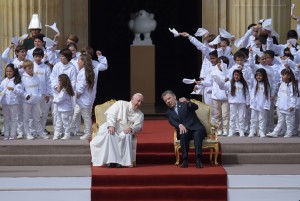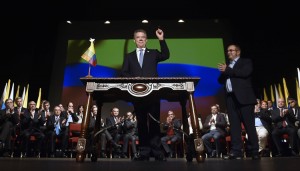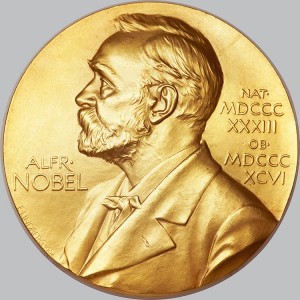Pope Francis in Colombia
Friday, September 8th, 2017September 8, 2017
On Wednesday, September 6, Pope Francis (Papa Francisco in Spanish) arrived in Bogotá, Colombia, for a five-day apostolic journey to the South American nation. Apostolic is another word for papal or having to do with the pope. Hundreds of thousands of people turned out to welcome the pope, who is particularly popular in the mostly Roman Catholic nations of Latin America. Francis is from Argentina and has been leader of the Roman Catholic Church since 2013.

Pope Francis and Colombian President Juan Manuel Santos talk during ceremonies at Casa de Nariño, the presidential palace in Bogotá, Colombia, on Sept.7, 2017. Credit: © Raul Arboleda, AFP/Getty Images
Yesterday, September 7, Francis met with Colombian President Juan Manuel Santos at Casa de Nariño, the presidential palace in Bogotá, where he congratulated the Nobel Peace Prize winner on ending a decades-long civil war between the government and the Revolutionary Armed Forces of Colombia (FARC). The FARC formed in the mid-1960′s as a guerrilla group with Communist ideals. Santos oversaw a peace process that culminated in a historic treaty with the FARC in November 2016. A month later, Santos accepted an invitation from Francis and visited the pope at Vatican City. The pope then promised to go to Colombia in return.
The theme of Francis’s Colombian journey is Demos el primer paso (Take the first step), a reference to the peacemaking process in Colombia—which is not yet complete. Violent drug cartels still reign in pockets of the country, and a second revolutionary group, the National Liberation Army (ELN), is still conducting peace talks with the government.
Yesterday afternoon, Francis visited the Catedral Primada (Primary Cathedral) in Bogotá’s teeming Bolívar Square, and he delivered a blessing from the the Cardinal’s Palace next door. Francis then held an outdoor Mass before more than 1 million worshipers at the city’s Simon Bolívar Park. Today, September 8, Pope Francis is in the central city of Villavicencio for a Mass and the beatification of Jesús Emilio Jaramillo Monsalve and Pedro María Ramírez Ramos, priests who were both assassinated during times of violence in Colombia. Beatification is the declaration by papal decree that a dead person is among the blessed in heaven and deserves religious honor.
Tomorrow, Francis’s visit to the northwestern city of Medellín will include a Mass and a stop at the Hogar San José orphanage. Francis will wrap up the apostolic journey on Sunday in the Caribbean coast city of Cartagena, where events will include services at the church and plaza of San Pedro Claver. The church contains the preserved remains of San Pedro Claver (1581-1654), a priest who dedicated his life to helping enslaved peoples of Spanish America. He is the patron saint of slaves and also a patron saint of the nation of Colombia.
Francis is the first pope from Latin America and the first Jesuit pope. Jesuits are members of a religious order called the Society of Jesus. Francis is known for his commitment to social justice, especially for the poor; his humble lifestyle; and his conservative religious beliefs. This was his fifth visit to Latin America since becoming pope. His previous stops were in Brazil; Bolivia, Ecuador, and Paraguay; Cuba; and Mexico.




